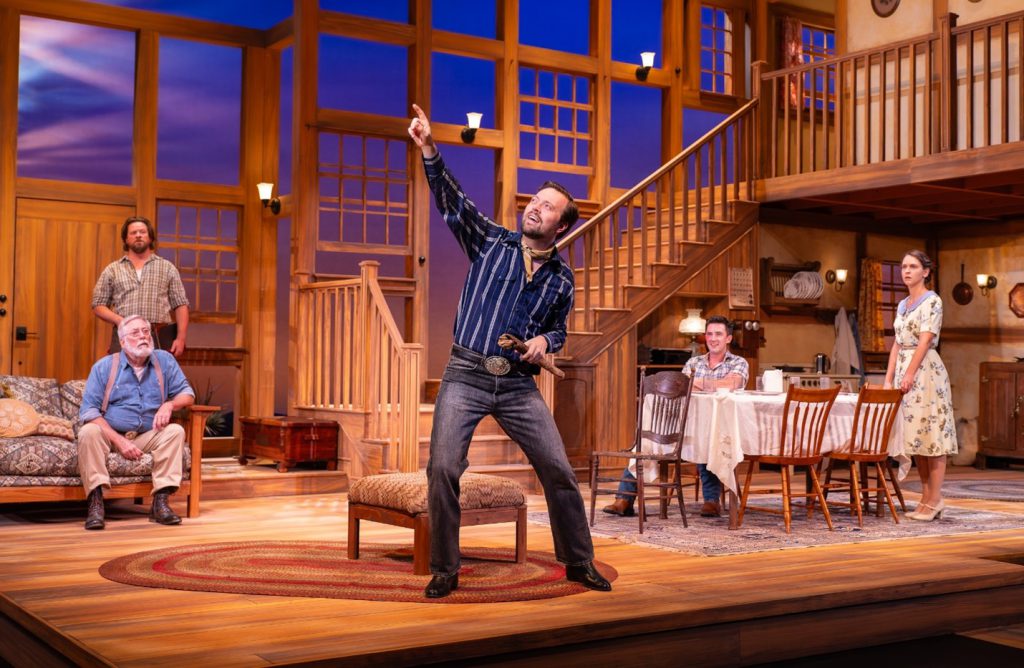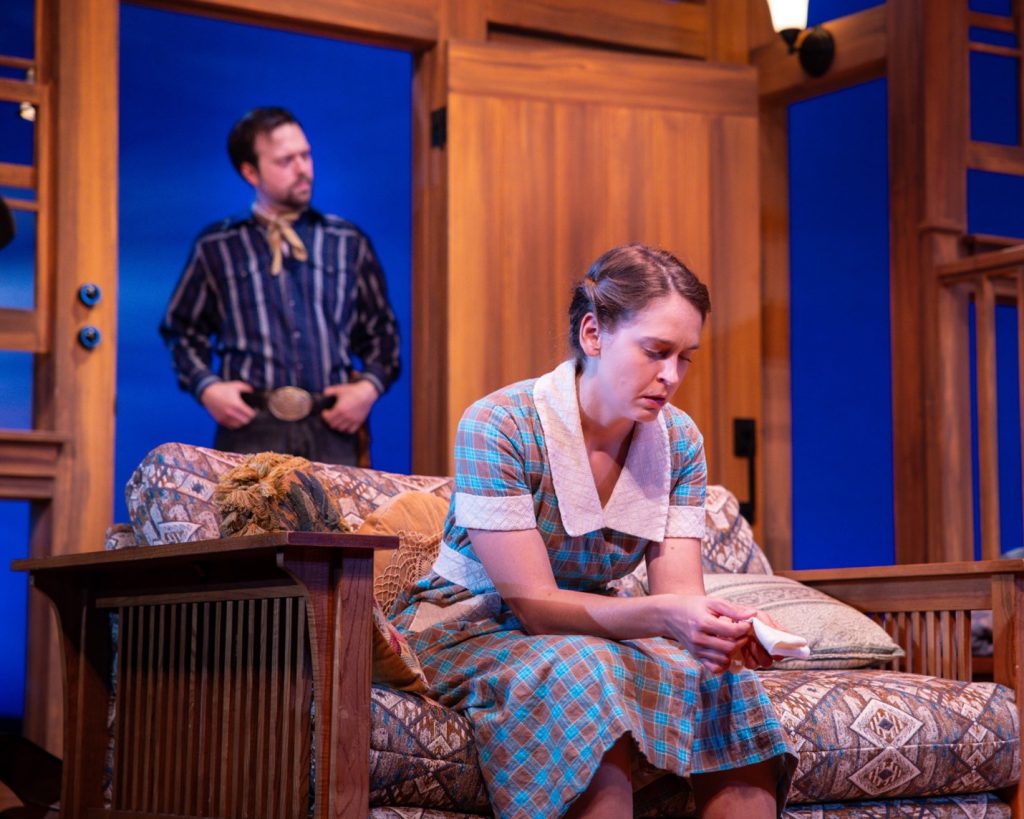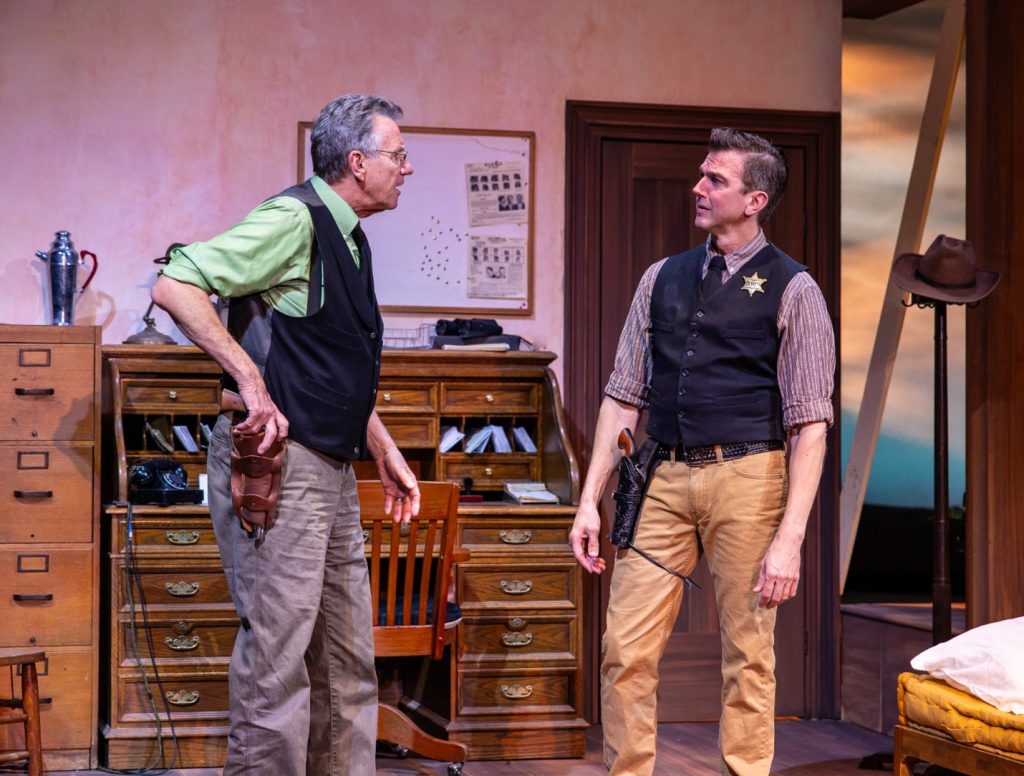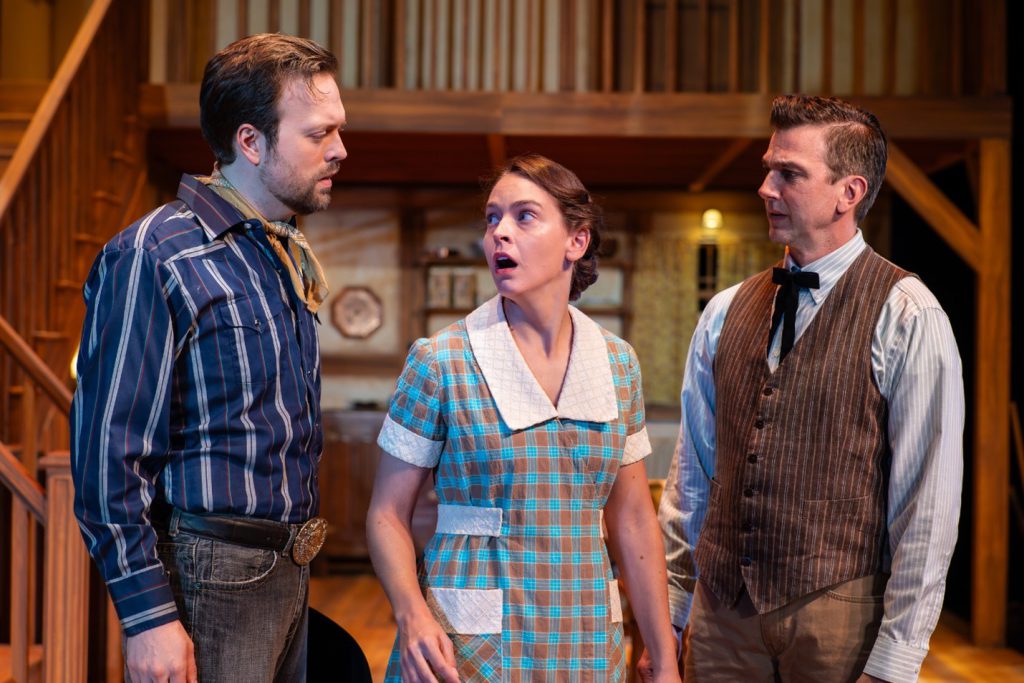
By Eric Marchese | Special to the NB Indy
Californians everywhere can relate to the miseries caused by drought. Whether that makes “The Rainmaker” more relevant now than when N. Richard Nash wrote it is something those attending Laguna Playhouse’s current production might ponder.
Seeing this solid, emotionally powerful staging, you soon realize that the drought being suffered by a small, unnamed rural town in an unnamed western state is simply a convenient, albeit dramatically sound, device to get us at the play’s heart: the parallel themes of self-doubt and the question of what it takes to get us to belief in ourselves.
The 1954 play is set during the Depression, when running a farm or ranch was already a challenge. Prolonged drought in the face of a collapsed economy could be crippling.
Like millions of others, widower H.C. Curry (Jeffrey Markle) and his three adult children have waited helplessly, hoping for rains. That makes them even more susceptible to the promises of Bill Starbuck (James Taylor Odom), a drifter who blows through town promising to bring rain within 24 hours for a $100 fee.
Phlegmatic eldest son Noah (Richard Baird) and hard-nosed sister Lizzie (Lizzie Zerebko) know a con man when they see one, so are dead-set against having anything to do with him.
Younger brother Jimmy (Nick Tag), though, is excited at the prospect of watching a self-professed rainmaker do his thing, and he’s able to sway H.C., who forks over the up-front cash payment.
From the get-go, Nash has us viewing Starbuck through the differing takes of each Curry: Can he really marshal the forces of nature and elicit a downpour? Or is he simply an opportunist preying on those desperate for rain?

The real heart of “The Rainmaker,” and our entrée into the Currys’ world, is whether Lizzie will ever find a husband. She’s intelligent and articulate, but also tough, outspoken, and physically plain. The issue consumes them, weighing more heavily on them than their worries about their drought-stricken ranch and dying cattle.
Lizzie seems to have just two choices, neither much palatable: Be herself and intimidate men more accustomed to women who wield their feminine wiles, or try coming off as a giggling, empty-headed flirt.
Nash skillfully intertwines the threads of desperate people’s belief in a rainmaker with Lizzie’s conviction that romantic happiness will always elude her. Poetry and pragmatism clash in a script that examines what happens when faith collides with daily life’s hard truths.
In Laguna, director Andrew Barnicle ably captures and harnesses the rhythms of Nash’s text, a minor masterpiece in the same mold as the works of his peer, William Inge.
The result is a naturalistic production devoid of contrivance or artifice. The entire cast delivers natural speech rhythms and a tangy Western dialect seemingly inherent and evocative of the region.
While Nash’s characters are comfortable in their own skin, he doesn’t shy away from the fact that their pain is never hidden from us, nor do the Playhouse’s actors.

Squaring off against Starbuck is Baird’s gruff, red-faced, no-nonsense Noah, whose watchwords are caution and restraint. Not just brittle, he’s outright bitter, and Baird’s portrayal just keeps peeling away more layers as we go.
Taking many a cue from Noah, Lizzie is all business and, sadly, accepts not being attractive as a fact.
An acrid persona and harsh sense of self-pity are just the starting points of Zerebko’s exceptional, layered portrayal. She shows us a woman worn down by an unexciting life – and who exhibits self-disgust at her singularly blunt, straightforward demeanor and a plain appearance she feels helpless to alter.
Tag doesn’t disguise Jimmy’s impetuosity, yet also reveals his sense of hurt at how Noah makes a point of demeaning his intelligence and gullibility. For his part, Tag isn’t afraid to show us the emotional sensitivity beneath Jim’s happy-go-lucky exterior.
Markle almost entirely uses his role as H.C. in support of his castmates. By doing this, he wisely mirrors this facet of his character, keeping H.C.’s all-encompassing love for his three children on display at all times.
Odom’s Starbuck is a garrulous, flashy, charismatic smooth-talker, and the actor cannily makes the character more style than substance, delivering swagger and charm.
Odom also uses Starbuck’s vocal style as a way to put people (including us) at ease and draw them in. And, thanks to Nash’s skilled writing, Starbuck proves to be insightful – a trait some might find surprising.
Among the more complex characters is File, the town’s deputy. This loner comes off as an earnest, decent fellow, but disquiet brews just beneath the surface.
File’s stubborn self-reliance has prevented him from any meaningful human contact – first from the wife who left him years earlier, and now, thanks to his self-imposed isolation, contact with Lizzie, the Curry family, and everyone around him.

Hoff projects the character’s loneliness without making him appear defensive or stubborn – which, given his dialogue, could easily occur. Director Barnicle himself provides stable stage presence as the town’s top cop, Sheriff Thomas.
Bruce Goodrich’s impressive scenic design give us the sizable kitchen, dining and living areas of the Currys’ ranch house, with a staircase leading up to the top floor hallway and doors to the second story’s rooms.
Flanking the house are, at audience left, the sheriff and deputy’s modest office and, audience right, the tack house where Lizzie undergoes an unexpected transformation.
Goodrich’s costume design, Jared Sayeg’s lighting, Ian Scot’s sound and Kevin Williams’ props both generate and feed into the naturalism that compels you to relate to the feelings and thoughts of every “Rainmaker” character.
Can belief alter reality? Playwright Nash uses Starbuck to answer yes, even despite the skepticism of people like Noah that Starbuck has clashed with for most of his life.
Laguna Playhouse, 606 Laguna Canyon Road, Laguna Beach. Through October 8. Running time (including intermission): Two hours, 15 minutes. 7:30 p.m. Wed.-Fri., 2 and 7:30 p.m. Sat., 1 and 5:30 p.m. Sun. Tickets: $50-$81. Ticket purchase/information: (949) 497-2787, www.lagunaplayhouse.com.
